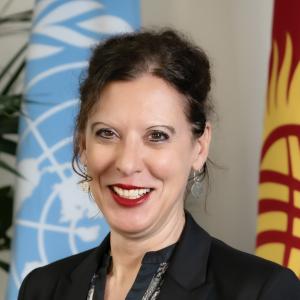Esteemed Deputy Toraga (Speaker) of the Jogorku Kenesh of the Kyrgyz Republic and Chairwoman of the Dialogue of Women Leaders of Central Asian countries, Ms. Isaeva,
Esteemed Members of the Cabinet of Ministers, Members of the Presidential Administration and Parliament of the Kyrgyz Republic,
Dear Kakha Imnadze,
Excellencies, dear colleagues, dear civil society representatives gathered here today,
It is a great honor for me to speak at this welcoming event on behalf of the UN System in the Kyrgyz Republic.
Let me start by thanking our host Deputy Speaker Ms. Isaeva for her very warm welcome, by thanking dear Kaha Imnadze for UNRCCA’s sponsorship of the Dialogue for a number of years, and by thanking UN Women and UNDP for their support in organizing this event.
It is a pleasure to be together here with such high-caliber women (and men) from Kyrgyzstan and the wider Central Asia Region and Afghanistan, who are at all the frontlines of policymaking, gender equality, prevention and peacebuilding efforts.
This is very much in the spirit of United Nations Security Council Resolution 1325 adopted 24 years ago and subsequent Resolutions making up the “Women, Peace and Security” (WPS) global agenda – for a full, equal and meaningful participation of women in peace-making, conflict prevention and peacebuilding.
The WPS agenda has become even more relevant in face of a record number of conflicts globally and increasing polarization over gender equality and the role of women in public life, including in our region. Since 2019, the number of women and girls living in conflict affected countries has doubled and, tragically, so have the lives lost due to violent conflict. Sexual violence in conflicts has also seen an alarming increase. At the same time, climate change is impacting livelihoods and posing risks to social cohesion and peace. Amidst these challenges, much more needs to be done to ensure women’s voices are heard and their leadership recognized.
The WPS agenda is at the heart of wider reform efforts led by the UN Secretary-General – as he highlighted during his recent tour of Central Asian countries – to increase the involvement of women and youth in decision-making.
This was also reflected in the Pact of the Future adopted by global leaders, including all the leaders of Central Asian countries, a little less than two weeks ago. I would like to highlight Action 19 of the Pact of the Future which specifically calls to “accelerate the implementation of our commitments on women, peace and security”, providing a fantastic platform to further strengthen our common work in this regard.
Ladies and Gentlemen,
As we need to respond to multi-faceted challenges, such as the securitization of migration, violent extremism, effective water resource management and climate security, novel approaches are required to involve women in peacebuilding, prevention and crisis response.
I am therefore particularly pleased that today’s women-led dialogue – building on yesterday’s expert discussions – focuses on rethinking approaches to promote women’s roles in promoting peace and stability in Central Asia and Afghanistan, including how to involve young girls and those coming from remote border areas in building sustainable peace.
Ladies and Gentlemen,
I am glad to see that discussions at this forum also focus on climate change and the role of women in mitigating its risks to peace and stability.
Climate change disproportionately affects women, especially in rural areas, where they often play an essential role in, for example, managing natural resources. By integrating the WPS agenda with climate peace initiatives, we can empower women as key actors in creating sustainable solutions that benefit entire communities. Harnessing local women’s knowledge and skills is essential in promoting sustainable solutions that benefit entire communities, leading to more effective resource management, and more sustained peacebuilding impacts.
Dear Participants,
The UN System in Kyrgyzstan is playing its part in partnering with all stakeholders, including the government, civil society, women and girls at national and local levels, in supporting WPS and Climate Peace and Security (CPS) agendas and the linkages of both.
Notably, joint programmes financed by the UN Peacebuilding Fund in Kyrgyzstan promote women’s participation in addressing localized climate-related challenges. They seek to build the institutional capacity of local women-led CSOs and women leaders at the local level, fostering participation in decision-making to contribute to addressing and reducing climate-related security risks. They also involve women and youth in the design and implementation of climate-smart agricultural practices, natural resource management, and agrifood entrepreneurship, including in border areas. A future project will empower women’s role in climate resilience, adaptation and peace, by further exploring ways to address climate risks, and their gendered impacts, with women-led solutions.
I am sure that the outcomes of today’s meetings and the recommendations that were collected during yesterday’s discussions, including the civil society representatives and experts, will help us further strengthen those initiatives and we look very much forward to continue working with you all in partnership as we further advance the role of women in these initiatives.
Thank you very much!








